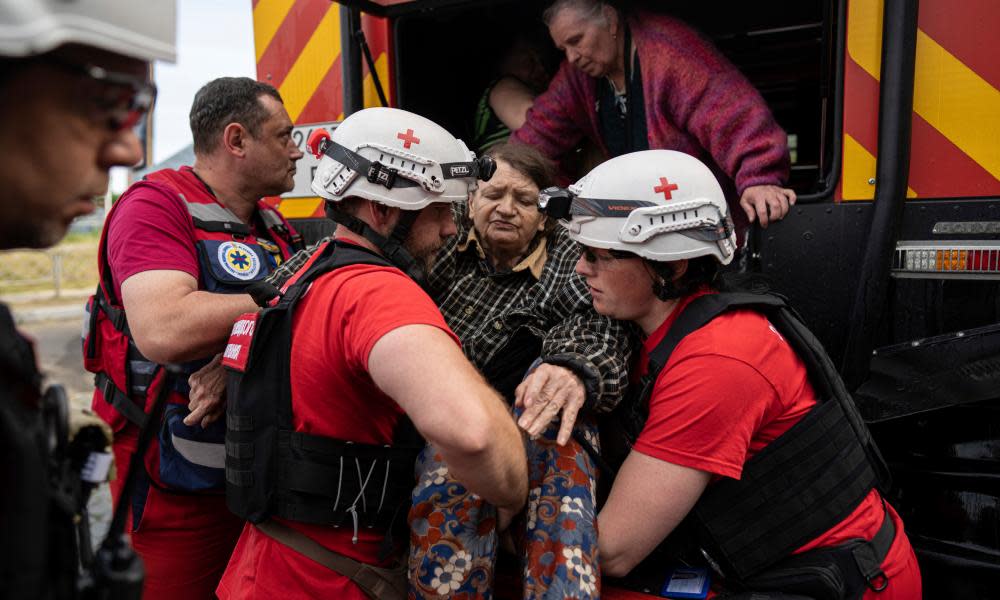Zelenskiy steps up criticism of International Red Cross over inaction at Kakhovka dam

Volodymyr Zelenskiy – well schooled in chiding the west for being slow in providing help – has shifted his line of criticism from the pace at which arms has been reaching his country to the slow international response to the humanitarian and ecological disaster caused by the breach of the Kakhovka hydroelectric dam.
Before visiting the flood-affected areas on Thursday, he used his nightly address to say: “Large-scale efforts are needed. We need international organisations, such as the International Committee on Red Cross, to immediately join the rescue operation and help the people in the occupied part of Kherson region. Each person that dies there is a verdict on the existing international architecture and international organisations that have forgotten how to save lives. If there is no international organisation in the area of this disaster now, it means it does not exist at all and that it is incapable of functioning.”
He told the German newspaper Der Bild that the UN and the ICRC “are not there”.
His remarks reflect his anger that the UN – and much international reporting – is not yet rebutting Russian claims of innocence over the dam’s destruction, or focusing on the Russian failure to help those on the occupied left bank to which the UN and the ICRC says they have been denied access by Moscow.
But his criticism is only his latest salvo in his savaging of the performance of the ICRC in Ukraine, as opposed to Red Cross Ukraine.
Zelenskiy and his circle believe the Geneva-based organisation has used the cover of neutrality, international law and confidentiality to mask a moral weakness.
Dmytro Lubinets, the Ukrainian ombudsman for human rights, said last month that every day he is “faced with the fact that the Red Cross does not want to perform its functions. But worst of all, the Red Cross has a monopoly and does not allow other organisations to appear.”
Related: Kakhovka dam collapse before and after: satellite images reveal extent of flood disaster in Ukraine
He said: “One organisation uses its history its name to get in the way of doing something impactful.”
Lubinets added Ukraine wanted a second organisation to be established with co-responsibility for accessing political prisoners, arguing that competition might spur the ICRC to be more proactive.
One bone of contention has been the ICRC’s approach to combatants. Ukraine’s anger was sparked by the ICRC’s inability to access Olenivka, a notorious camp in eastern Ukraine where dozens of Ukrainian PoWs died in an explosion and fire in July.
In his nightly address on 13 October, Zelenskiy said: “I believe the International Committee of the Red Cross is not a club with privileges where one receives a salary and enjoys life. The Red Cross has obligations, primarily of a moral nature. The mandate of the Red Cross must be fulfilled.”
The following month, apparently fed up with the perceived inaction, the president’s office announced the creation of a human rights information staff, saying the ICRC seemed incapable of calling out, or investigating, Russian human rights abuses.
In his address later that month to the G20 in Bali, Zelenskiy let rip again, saying: “11,000 children [who were forcibly deported to Russia], hundreds of thousands of deported adults, and … we have not found support in the International Committee of the Red Cross. We do not see that they are fully fighting for access to the camps where Ukrainian prisoners and political prisoners are held, or that they are helping to find deported Ukrainians.”
Zelenskiy questioned whether the ICRC could any longer claim the legal and moral right to be the upholders of international humanitarian law: “And such self-elimination is the self-destruction of the Red Cross as an organisation that was once respected.”
By contrast, Zelenskiy has expressed admiration for the more pugnacious style of Rafael Grossi, the director of the UN International Atomic Energy Agency, which has visited both Russia and Ukraine to uphold safety at the Russian-occupied Zaporizhzhia nuclear power station.
The natural style of the relatively new head of the ICRC, a former Swiss diplomat, Mirjana Spoljaric Egger, is one of discretion. She says the mandate of the ICRC means that it is not an advocacy group or a body capable of mounting inquiries. Faced by a world in which the post-1945 respect for an agreed rules-based order has eroded, she cannot unilaterally enter prison camps or order cooperation from the countries with which she has to deal. Accumulated trust, neutrality and confidentiality are critical components of success for the ICRC, she believes.
She has 1,000 staff in Ukraine, and recently said: “The closer you come to the front line, the more people know how important neutrality is because it protects you. We have very little means of assuring safety and security for our staff other than our strict 160-year-old neutrality and impartiality.”
She is also facing budget cuts. The ICRC recently announced that it would have to cut 1,800 jobs to save $440m (£350m) from its $3.2bn budget.
Efforts were clearly under way on Thursday to patch up relations with meetings between UN and Ukrainian officials in Kherson. The Ukrainian Red Cross was also stressing that it was active on the ground.
In a statement, UN’s humanitarian body said it had organised water trucking and delivered more than 100,000 bottles of drinking water, water purification tablets and jerrycans to affected communities in the Kherson region.
The UN coordinator on humanitarian affairs, Martin Griffiths, a hugely experienced British diplomat, insists his teams are already active on the ground, and he was working to gain access to Russian-controlled areas.

 Yahoo News
Yahoo News 
